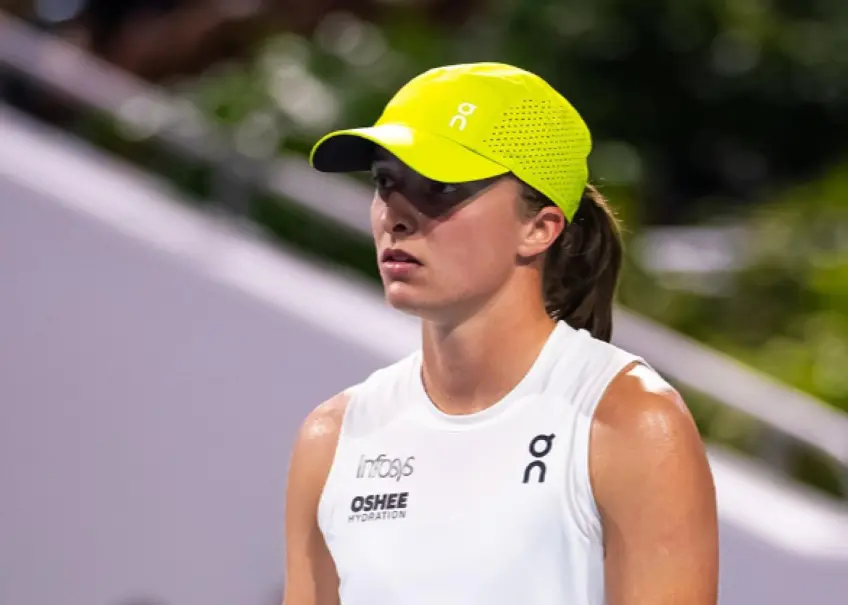
As the tennis world gears up for the 2025 Australian Open, a cloud of concern hangs over Iga Swiatek, the five-time Grand Slam champion whose meteoric rise has captivated fans globally. Andrea Petkovic, a former top-10 player and respected voice in the sport, has voiced fears that Swiatek may be grappling with mental health challenges following a tumultuous 2024. The 23-year-old Pole, known for her relentless focus and clay-court dominance, faced what she called “the toughest battle of my life” after a one-month doping suspension, a saga that Petkovic believes could hinder her chances of a breakthrough in Melbourne.
Swiatek’s 2024 season was a rollercoaster of triumphs and trials. She clinched her fourth French Open title, solidifying her status as a Roland Garros titan, and added a bronze medal at the Paris Olympics. But off the court, a positive test for trimetazidine—a heart medication banned by the World Anti-Doping Agency—rocked her world. The International Tennis Integrity Agency (ITIA) issued a provisional suspension, sidelining her for the Asian swing, including the China Open and Canadian Open. Though cleared with a no-fault verdict after proving the substance came from contaminated melatonin, the ordeal left scars. “I was battling my toughest battle that I ever had, and not feeling well,” Swiatek admitted in a January 2025 interview, her voice heavy with the weight of the experience.
Petkovic, who reached No. 9 in 2011, expressed her concerns in December 2024, noting Swiatek’s visible “anxiousness” during the doping controversy. “I thought 2025 would be the year Iga finally makes her big Australian Open breakthrough,” she said, referencing Swiatek’s modest Melbourne record—a lone semifinal in six appearances. “But knowing that she can’t that easily block out the noise and possible distractions, it will take some time before she starts playing her best.” Petkovic’s fears stem from Swiatek’s admitted struggle to tune out external pressures, a vulnerability exacerbated by Polish media speculation that falsely claimed she was battling depression and burnout. “They diagnosed me with mental health disorders,” Swiatek lamented, decrying the “clickbait titles” that amplified her distress.
Swiatek’s mental health has long been a priority. Since 2019, she’s worked with sports psychologist Daria Abramowicz, a former competitive sailor whose holistic approach—emphasizing sleep, nature, and relationships—has been credited with Swiatek’s resilience. “It’s unique, it’s amazing,” Abramowicz said in 2022, praising Swiatek’s commitment to mental training. Yet, the grueling tennis schedule, which Swiatek has called “pretty exhausting,” has taken a toll. In 2024, new WTA rules mandated participation in 16 events beyond the Grand Slams, up from 10, leaving little room for rest. “We don’t have time to live peacefully,” she said at the US Open, joining players like Elina Svitolina in decrying the sport’s relentless demands.
The doping saga, coupled with a coaching change—she parted ways with Tomasz Wiktorowski in October 2024 to join forces with Wim Fissette—has added layers of complexity. Fissette, who aims to bolster Swiatek’s game on non-clay surfaces, faces a daunting task in Melbourne, where she suffered a shock third-round exit to Linda Noskova last year. “Once she shakes it off, I think she will start playing really well again,” Petkovic predicted, optimistic about Swiatek’s long-term prospects. “I think she will be great in 2025, even better than she was this year.”
Swiatek’s return at the United Cup in January 2025 showed promise—she won all her singles matches before falling to Coco Gauff in the final—but her emotional candor revealed lingering wounds. “I hope you will stand by me,” she pleaded with fans, acknowledging the doping ordeal’s toll. Social media buzz, including posts from tennis insiders, has echoed Petkovic’s concerns, with some noting Swiatek’s quieter demeanor in recent appearances. Yet, her perfectionist streak and fierce forehand remain formidable, and with Fissette’s guidance, she’s determined to conquer Melbourne’s hard courts.
As the Australian Open looms, Swiatek stands at a crossroads. Can she silence the noise and reclaim her dominance, or will the mental scars of 2024 prove too heavy? Petkovic’s warning underscores the fragility of even the toughest champions, but Swiatek’s history of overcoming adversity suggests she’s far from finished. In a sport where the mind is as critical as the racket, her journey promises to be as compelling as any match point.
Leave a Reply